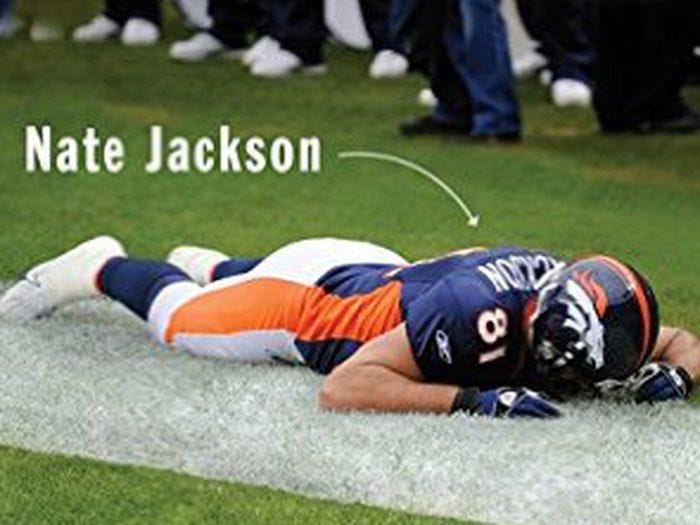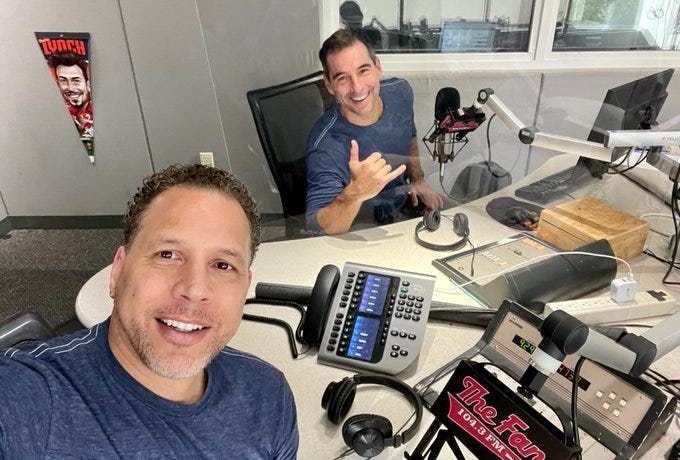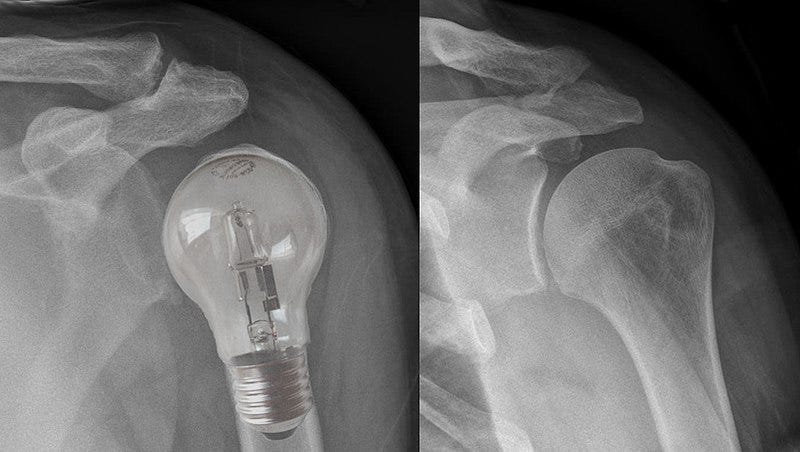The Scariest Book I’ve Read About Football Injuries
Former Denver Bronco Nate Jackson looks back on his alarming medical history in his memoir

Even players used to seeing teammates carted off the field wept when Damar Hamlin fell backward after making a tackle and didn’t get up.
The Bills’ safety had gone into cardiac arrest during a game against the Bengals on January 3, 2023, as millions of “Monday Night Football” fans watched. He received immediate medical care on the field, but his condition was so dire that the NFL took the rare step of calling off and later canceling a game because of a player’s injury.
Hamlin spent days in critical condition in an intensive care unit, followed by a long recovery, and returned to limited play this season. He received a standing ovation when, in the Nov. 13 game against the Denver Broncos, he took his first defensive snap since his horrific collapse.
Well-earned as the praise for Hamlin was, Nate Jackson’s Slow Getting Up: A Story of NFL Survival From the Bottom of the Pile (Harper Perennial, 2014) makes you suspect fans ought to spring to their feet more often for players.

This entertaining memoir leaves the impression that it’s a good thing Jackson never made it to the Super Bowl during his five-year playing career. Given his Homeric battle with injuries, he might have torn up a few more body parts by the time a referee whistled the first play dead.
Slow Getting Up is the most alarming memoir I’ve read about the toll football can take on your health. And that includes books about Vince Lombardi’s days with the Packers, Bill Belichick’s with the Patriots, and at the college level Paul “Bear” Bryant’s and Nick Saban’s with the University of Alabama.
Jackson reproduces verbatim his medical reports from his years as a tight end and wide receiver for the Broncos, obtained by a subpoena during a worker’s-compensation suit. They’re as chilling as anything you might find on the fiction shelves, perhaps more so if you’re the parent of a child who hopes to play football at any level. Jackson writes:
“During my football career, I dislocated my shoulder multiple times, separated both shoulders, broke my tibia, broke a rib, broke my fingers, tore my medial collateral ligament in my right knee, tore my groin off the bone, tore my hamstring off the bone twice. I had bone chips in my elbow, bone chips in my ankle, concussions, sub-concussions, countless muscle strains, labral tears in either hip, cumulative trauma in the lower spine, sciatic nerve damage, achilles tendinitis, plantar fasciitis in both feet, blisters — oh the blisters! My neck is bad. My clavicles are misaligned. I probably have brain damage.”

All of his injuries might sound easy to diagnose and treat individually, Jackson notes.
“Your groin is torn,” he writes. “Look up ‘torn groin’ in the index, find the list of exercises to plug into your daily rehab regimen, and you’re off and running. But seen from a distance, the litany above tells me something different. The injuries are all connected. One injury leads to the next, to the next, to the next. The aggressive rehabilitation of one muscle neglects its opposite. The body is thrown out of balance.”
Jackson’s injuries forced him from the sport after five years. That premature exit from the game left him with time to write Slow Getting Up, a book that proves that a professional football player can use “contextualize” and “neophytic” in a sentence.
You could argue — as some critics have — that Jackson spends too much time discussing the hotel-room masturbatory habits of football players traveling without their wives or girlfriends. (He says he wasn’t “a pre-game self-gratifier.”) Or you could just enjoy his sense of humor — by turns droll, self-mocking, and sarcastic — that doesn’t spare his teams.
Why drug testers watch players pee
Jackson refers to every professional-sports stadium as “[Insert Corporate Logo Here] Field” and offers memorable glimpses of their locker rooms.
Why does the NFL require its drug testers to watch players urinate, not just collect cups? Jackson says the practice began after a player was caught at an airport with a prosthetic penis called the Whizzinator.
Casual football fans may need a translator to understand a few of Jackson’s postgame reports:
“If the wedge comes free to me and the R2, and all the other guys get blocked, then the R2 and I must eat up the wedge and spill the returner outside into the arms of the R1.”
Jackson also wrote the book before the NFL modified its concussion protocols after a harrowing injury to Dolphins quarterback Tua Tagovailoa in 2022.
Yet he knows how to reduce his sport to its emotional and physical essence. Why do so many on-field moves have names — like “head fake” or “pump fake” — that connote deception? Jackson suggests an answer:
“So much of offensive football is lying with your body, getting the defender to think you are going somewhere you aren’t. Tell a story with your movements: a bloody lie!”
After retiring from football, Jackson became, in 2010, an on-air host on the Denver sports radio show “The Fan,” a job he left in the fall of 2023 during a shakeup at the station. His next move is unclear, and you can only hope that, whatever job he takes, it will come with excellent health insurance.
@JaniceHarayda is an award-winning critic journalist in Alabama whose articles on books, sports, and other topics have appeared in many major print and online media.
You might like another of my stories about football:
